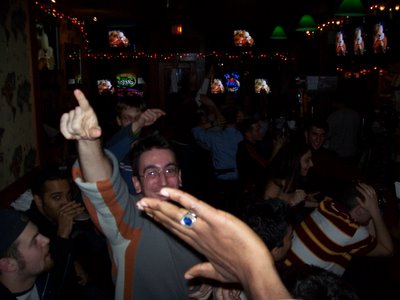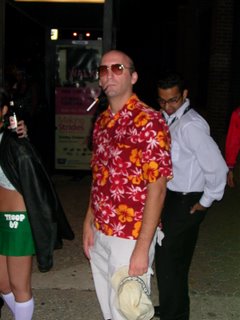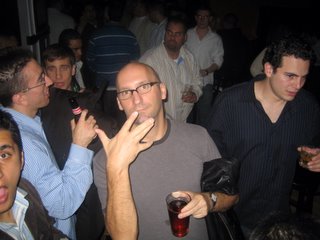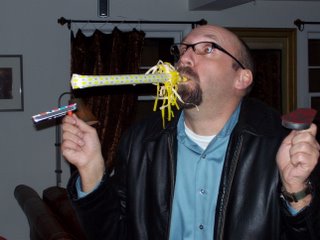"That's the submandibular gland, right there. No thanks necessary"
Right now in anatomy lab we are dissecting the neck. This area of the body is really complicated; there are a lot of intricate structures, arteries, veins, nerves, tiny muscles, etc. Thus, you have to be really careful when you dissect to avoid destroying things you need to locate. In fact, Dr. Cutty has mentioned multiple times that this is an area where caution is extremely important. So much so that we don't even use scalpels in this area, just these blunt probes that look a lot like metal chopsticks. This way one avoids inadvertently slicing that delicate, yet exceedingly important nerve or arterial branch.
Occasionally we have visiting physicians in the lab. Some people from the Emergency Department have shown us how to place chest tubes and do tracheostomies. We have had pathologists in to talk about different diseases our donors had before they died or to describe abnormal anatomy we find in the bodies. Radiologists come in to teach how to read X-rays and CT scans and MRIs. These doctors are great. They come into the lab to talk about the clinical things they do day in and day out. They clearly are the experts in what they do and what they are demonstrating in lab.
Then there is another kind of visiting physician. These are the doctors that want to "give back" to the school by helping us unsophisticated med students with anatomy. I'm not sure if these people are invited to help or if they are proactively volunteering their time to spend a day in the anatomy lab. We've had surgeons, gynecologists, oncologists and others "help" us out with our dissections. Today we had this guy who was an ear nose and throat (ENT) specialist. I have a few issues with these folks, paricularly with the guy we had lending us a rather destructive hand today.
I'm sure these people are excellent physicians. If I had an ear nose or throat disease, I'd probably be extremely lucky to have this gentleman taking care of me. The problem lies in the fact that the last time this guy was in an anatomy lab was at least 10 years ago. Thus, his dissecting skills are most likely not as sharp as they once were. Furthermore, in training to become a physician, one is not trained to be an anatomy lab instructor. You see, we have lab instructors already, with PhD's, in anatomy!
When he first came to the table he seemed nice enough. In fact, he actually said "Don't mind me, I'm just watching what you're doing." At the time, I was looking for a really fragile nerve in the neck and was checking a reference book to get an idea where to find it. The guy looked at me and said that I was looking in totally the wrong area and that I should be digging much deeper in the neck to find it. He then promptly grabed a scissors and jammed it deep into the cadaver's neck and ripped at the tissue in search of this one nerve. As I stared in shocked, mute horror, he tore open what was obviously a large and now shredded neck vein.
"Oh," he said, "that's your internal jugular vein." Then he smiled weakly, dropped the scissors on the table and walked away. All that Doublestuff, Minerva and I could do was stare at each other with that "did that just fucking happen?!" look on our faces. As I looked back down at the cadaver, right in the area I was originally dissecting, there, now also shredded, was the nerve I wanted to find in the first place.
At this point I'm pretty pissed, but what can you do? The guy is an MD, and he is there to help us. Besides, there are two sides to the neck and we can always work on the opposite side of the massacre to find the rest of the anatomy we need to identify. The remainder of the lab time was very productive and we were making great progress...until about 20 min before lab ended. The good doctor returned to our table.
At that point we were trying to find some of the very fine muscles between the Adam's apple and the chin. One of those muscles wraps around the submandibular gland. The mandible is just the anatomical name of your lower jaw bone and there is a salivary gland that lies just under and on the inside of it called the submandibular gland. As Dr. Shredder walked up to the table I was saying out loud to Doublestuff that all we need to do was locate the submandibular gland and we should be able to find...
"The submandibular gland? It's right here!" Dr. Shredder yells as he plunges his fat finger deep under the cadaver's jaw and wrenches all the muscles free from the bone. He then points to a round structure and proclaims "That's the submandibular gland, right there! No thanks necessary." and struts off to the next table. I look back at the tattered remains of our poor donor's jaw musculature and notice that what the good doctor was calling a gland was actually the jaw bone itself, freshly exposed by his ham-fisted dissection technique. Whereas before I was merely pissed, after that I was motherfucking livid.
I'm sure these physicians mean well in their efforts to help the students in the lab. Honestly, some are good at the dissections. And yes, I am a weeeeee bit of a control freak. I think the core of my issue is that doing a good job on the bodies serves no interest of theirs. If Dr. Shredder messes up the dissection today, does he care? Are there any repercussions in his life? No. Tomorrow at this time he's back in his ENT clinic writing his 30th Flonase prescription of the morning and still pulling down $250K a year. My lab partners and I? We on the other hand are not so lucky. We get the fun of wandering the anatomy labs looking for another group willing to let us look at an intact digastric muscle so we can identify it on an exam.







